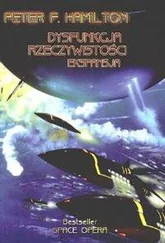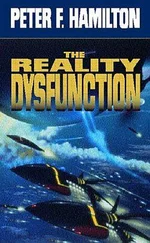Peter Hamilton - Judas Unchained
Здесь есть возможность читать онлайн «Peter Hamilton - Judas Unchained» весь текст электронной книги совершенно бесплатно (целиком полную версию без сокращений). В некоторых случаях можно слушать аудио, скачать через торрент в формате fb2 и присутствует краткое содержание. Жанр: Фантастика и фэнтези, на английском языке. Описание произведения, (предисловие) а так же отзывы посетителей доступны на портале библиотеки ЛибКат.
- Название:Judas Unchained
- Автор:
- Жанр:
- Год:неизвестен
- ISBN:нет данных
- Рейтинг книги:5 / 5. Голосов: 1
-
Избранное:Добавить в избранное
- Отзывы:
-
Ваша оценка:
- 100
- 1
- 2
- 3
- 4
- 5
Judas Unchained: краткое содержание, описание и аннотация
Предлагаем к чтению аннотацию, описание, краткое содержание или предисловие (зависит от того, что написал сам автор книги «Judas Unchained»). Если вы не нашли необходимую информацию о книге — напишите в комментариях, мы постараемся отыскать её.
Judas Unchained — читать онлайн бесплатно полную книгу (весь текст) целиком
Ниже представлен текст книги, разбитый по страницам. Система сохранения места последней прочитанной страницы, позволяет с удобством читать онлайн бесплатно книгу «Judas Unchained», без необходимости каждый раз заново искать на чём Вы остановились. Поставьте закладку, и сможете в любой момент перейти на страницу, на которой закончили чтение.
Интервал:
Закладка:
And fate—mine, the Starflyer, humanity, the Primes—is decided by that tiny distance. But then my fate has taken stranger turns than this in the past. Perhaps the dreaming heavens will smile upon me today.
The movement outside his suit ended. Bradley switched on a lone sensor, and scanned around. There was no immediate sign of the soldier motiles. He stood up, and watched the alien army charge away. Some distance farther along Highway One an armored car exploded.
Keeping the suit fully stealthed, Bradley hurried toward the giant alien starship. He opened passive sensors, knowing the signal he would receive.
Not a sound or an image, at first, more a mélange of feeling—to those who knew how to interpret it. The complex electronic song saturated the air waves, broadcast from every direction to engulf the valley. Together the harmonics that surrounded Bradley had a unity that was remarkable in its complexity. The tunes rose and fell, meshing into a cohesive mind. Bodies, alien and human, sharing every part of themselves: memories, thoughts, sensations. He moved among them, receiving their extended cognizance, drinking it in. Watching the three humans in armor suits running along the road as we chase after them—concern that the human warriors should not be able to interfere with the launch. Observing the many technological facets of the refurbished starship, adjusting the systems as they interact with each other—eager for the long exile to finally end. Maintaining the force field around the ship—determined that no weapon would penetrate. Reviewing the sensors covering the valley—alert for transgressions.
The location and purpose of each body were individual, yet their thoughts were homogenized, replicating their originator. Direction, purpose, came from only one source: the Starflyer.
It moved from the gantry lift into the starship, awakening the giant machine in its entirety. Soon it would leave to vanish amid the stars. Safe. Free.
Bradley told the force field around the starship to admit him. Compliance was a logical thing to expect, given the Starflyer’s ultimate origin. The immotile rules all, nothing deviates from that. However, as the Starflyer was more sophisticated than a standard Prime immotile, it didn’t have the same reticence in allowing electronics to have governing functions over machinery. Electronics were subsidiary to it in the same way as motiles; it programmed them, it set their parameters. They obeyed it.
That was its flaw, Bradley knew, the same as every Prime. It did not understand independence nor rebellion. Its motiles, whether grown in congregation pools from its own advanced genetically modified nucleiplasms, or humans whose brains had been surgically and electronically subsumed to host its own thought routines, were a part of it. Their thoughts were its thoughts, copied and installed from its own brain. None of them deviated. It couldn’t conceive deviation or betrayal, so neither could they.
Security was a one-dimensional concept for the Starflyer. It took precautions to guard itself physically and politically from native humans as it insinuated its human motiles within their Commonwealth society. That was the level of safety it determined it required to insure its survival, a strategy that had been successful.
No human could hack into the electronic network of the Institute valley; as the processors were an extension of the Starflyer’s own mind, they only acknowledged orders that had an internal heritage. What the network and its processors did not have was the ability to discriminate between an order from a genuine motile and a human who remembered the neural “language” of the Starflyer.
In front of Bradley the force field protecting the Marie Celeste realigned its structure to allow him through. He jogged along the bottom of the deep grassy scar that the vast alien ship had scored as it slid along the ground before finally coming to an ignominious halt. Several soldier motiles were patrolling the base of the starship. Their minds told him where they were, the direction they were looking in, where they would look next. Their sensors and eyes never saw his suit’s stealth coating as he hurried into the shadows cast by the big fusion rocket nozzles. Proximity alarms watched passively as he told their processors his presence was legitimate.
The ship had been lifted gradually out of the scar by motiles and civil engineering machinery. A wide pad of enzyme-bonded concrete had been laid underneath to support the weight. Cradles gripped the lower fuselage, holding it off the ground. Bradley walked up the metal stairs on one of the cradles. An access hatch to the fusion engineering bay opened for him, and he ducked inside.
The initial findings on the Marie Celeste published by the Institute were accurate enough. It was comprised of fusion rockets, their fuel tanks, environmentally maintained water tanks containing an alien amoeba-equivalent cell, and the force field generators. From that, public perception remained locked on the knowledge that there was nothing else inside; certainly it possessed no life-support section, no “crew quarters.” A more detailed examination showed (unpressurized) access passages and crawlways remarkably similar to those humans would design into any ship. No maintenance robots were ever found. The first conclusion was that the passages were used only for construction.
Right at the center of the tanks there was a chamber with a life-support system. The Starflyer lived in that, fed with base cells and purified water from the tanks. It didn’t need additional space to move about in; there were no leisure and recreational facilities that any human would have needed during a centuries-long flight. All it did was receive information and supervise the ship’s systems. When necessary it would ovulate nucleiplasms into a freefall vat to grow space adept motiles that would be dispatched on repair assignments. After they had completed their task they would be recycled into nutrients for the base cells in the tanks. Every century a new immotile would be created to house the Starflyer’s mind as the old body aged. All this in a chamber of thirty cubic meters. Easy for a preliminary examination to miss in a volume of twenty-five million cubic meters, especially as it had been badly damaged during the landing.
There were no lights inside the engineering bay, another aspect contributing to the myth of the ship being “solid machinery.” Bradley turned his infrared sensors up to full resolution, and made his way along the cramped passage. It branched several times, some openings like vertical chimneys leading up to the center of the ship. Climbing would take too long for him; he found a corridor leading toward the prow and moved as fast as he could. The corridor walls were open girders. Beyond them, the ship’s major segments were held together inside a simple gridwork. The individual beams of metal were shaking as the fusion drives worked down their ignition sequence. In two minutes the ship would lift from this world to the clean emptiness of space.
Bradley clambered out of the corridor and began to worm his way up through the narrow gap between a deuterium tank and some car-sized turbo pumps. The mindsong of the Starflyer remained perfectly clear to his receptors, even wedged into the lightless metal cavity.
“Remember me?” he asked.
Every motile in the Institute valley froze.
“You do, don’t you? I made sure you wouldn’t forget me.”
The mindsong altered, reaching out into the brains of each human motile contained within the Starflyer’s mental empire. Questioning. Processors ran checks on themselves to see where the aberrant harmonics were coming from.
“Oh, I’m in here with you.”
Outside the ship, the song faltered, withdrawing.
“You didn’t think I was going to miss this moment, did you? I want to be with you when we launch. I want to be certain. I want us to be together when we die.”
Читать дальшеИнтервал:
Закладка:
Похожие книги на «Judas Unchained»
Представляем Вашему вниманию похожие книги на «Judas Unchained» списком для выбора. Мы отобрали схожую по названию и смыслу литературу в надежде предоставить читателям больше вариантов отыскать новые, интересные, ещё непрочитанные произведения.
Обсуждение, отзывы о книге «Judas Unchained» и просто собственные мнения читателей. Оставьте ваши комментарии, напишите, что Вы думаете о произведении, его смысле или главных героях. Укажите что конкретно понравилось, а что нет, и почему Вы так считаете.












